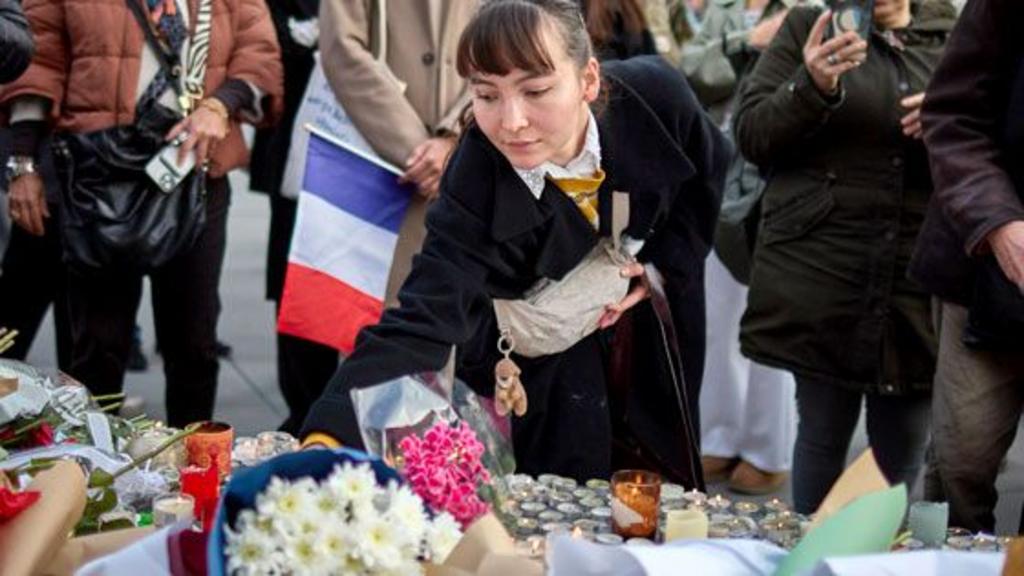As France commemorates the 10th anniversary of the Bataclan attacks, the enduring nature of the jihadist threat is once again brought into sharp focus.
The former girlfriend of Salah Abdeslam, the sole surviving jihadist from the November 2015 attacks, has been apprehended on suspicion of plotting a violent act.
Maëva B, a 27-year-old French convert to Islam, reportedly engaged in correspondence with Abdeslam, 36, who is currently serving a life sentence near the Belgian border following his 2022 conviction.
Prison authorities discovered that Abdeslam had been utilizing a USB drive containing jihadist propaganda, tracing its origin to in-person meetings between the prisoner and Maëva B.
An investigation into Maëva B’s electronic devices allegedly uncovered evidence suggesting she was planning a jihadist attack. Consequently, she was placed under judicial investigation on Monday, along with two alleged accomplices.
The arrest coincides with France’s remembrance of the decade since its worst modern terror attack, highlighting the persistent threat.
Interior Minister Laurent Nuñez stated that six plots have been thwarted this year, emphasizing that the threat level remains elevated.
“Unfortunately, no one can guarantee the end of attacks,” President Emmanuel Macron acknowledged at the inauguration of the Jardin du 13 Novembre 2015 memorial garden.
“But we can guarantee that for those who take up arms against France, the response will be uncompromising.”
On the evening of November 13, 2015, coordinated attacks by jihadist gunmen and suicide bombers culminated in a deadly assault on the Bataclan concert hall in eastern Paris.
Prior to the Bataclan attack, three suicide bombers detonated explosives outside the Stade de France during an international football match, while other members of the group opened fire on patrons at nearby bars and cafés.
During a performance by the American band The Eagles of Death Metal at the Bataclan, three jihadists stormed the venue, indiscriminately firing into the audience, taking hostages, and ultimately detonating their explosives as police intervened.
The attacks resulted in 130 fatalities, with 90 occurring at the Bataclan, and over 400 individuals requiring hospital treatment. The psychological impact on countless others remains profound.
The term “Bataclan” has since become synonymous with extreme Islamist attacks in France, akin to the significance of “9/11” in the United States.
While subsequent attacks have occurred, such as the Nice truck attack in July 2016 and the beheading of teacher Samuel Paty in October 2020, the scale and coordination of the November 13, 2015 attacks set it apart.
A decade later, significant changes have transpired. The diminished presence of the Islamic State (IS) group in Syria and Iraq has curtailed the capacity to conceive, plan, and execute complex terrorist operations.
The Bataclan attackers were primarily young men of North African descent, recruited in Belgium and France, trained in IS territory in the Middle East, and subsequently returned to Europe among a large influx of migrants.
They relied on a network of supporters who provided shelter, transportation, and financial assistance.
According to Middle East expert Gilles Kepel, intelligence services have enhanced their effectiveness in monitoring online radicalization.
“They now have access to IT resources… which allow them to detect a lot of individual initiatives, often not very sophisticated ones… and stop them before they hatch,” he stated in an interview with Le Figaro.
However, Kepel warns of the emergence of “ambient jihadism.”
“The threat is now home-grown and a lot younger. It feeds on friendships and social networks of the like-minded, without there ever necessarily being people having to give and obey orders,” he explained.
This threat is particularly concerning due to its pervasiveness, with events in Gaza and Israel exerting a “traumatic effect” on many citizens and being “exploited by the entrepreneurs of anger.”
France’s current political climate also exacerbates the danger, with a weakened presidency and a divided parliament where extremist voices are gaining influence.
“If what separates us becomes more important than what unites us as French people and fractures the national consensus, then there will open a chasm beneath our feet and violence will have fewer and fewer restraints,” he cautioned.
Commemorations are scheduled throughout Thursday at the various attack sites, culminating in the opening of the new 13 November garden in central Paris.
In the evening, the Eiffel Tower will be illuminated in the colors of the French flag.
French media have featured numerous accounts and recollections, with survivors sharing their experiences and how their lives have been impacted.
In a surprising development, Salah Abdeslam, through his lawyer, has expressed a willingness to participate in “restorative justice” efforts, a process where victims and perpetrators engage in dialogue about the crime’s impact.
While some families have considered the idea, others vehemently oppose it.
Laurent Sourisseau, a cartoonist also known as Riss who was injured in the Charlie Hebdo attack, views Abdeslam’s offer as “perverse.”
“Restorative justice exists for other types of crime – common crimes,” he stated.
“But terrorism is not a common crime. Salah Abdeslam wants to make us think his crime was like any other. But it was not.”
A city comes together for a charity set up in memory of Bataclan terror victim Nick Alexander.
The mystery youth in the photo turns out to be Pedro Elias Garzon Delvaux, a 15-year-old detective fan.
Clashes broke out during one of three disruptions to the performance featuring conductor Lahav Shani.
Three weeks after the spectacular jewel theft at the Louvre, the museum is accused of neglecting safety and security.
The online shopping giant opened its first physical shop in the world – in a Parisian department store.

